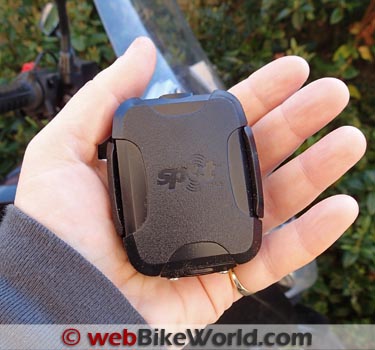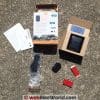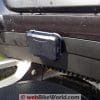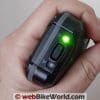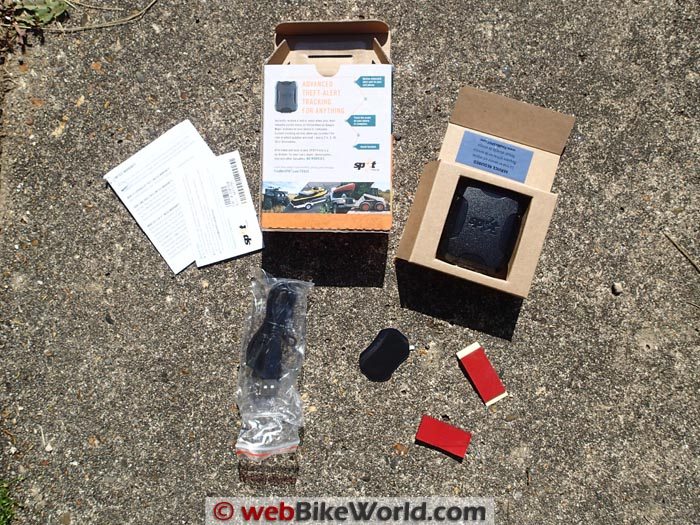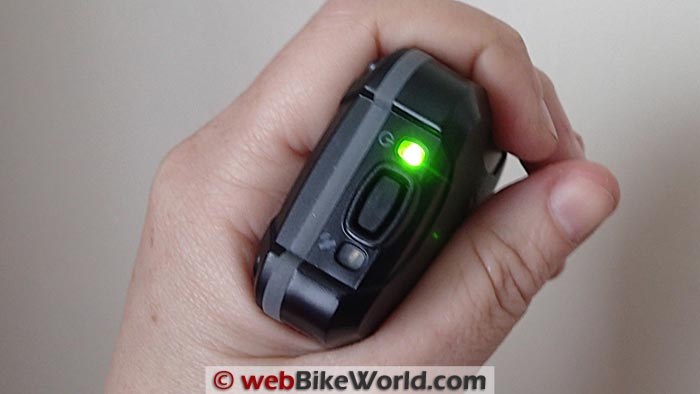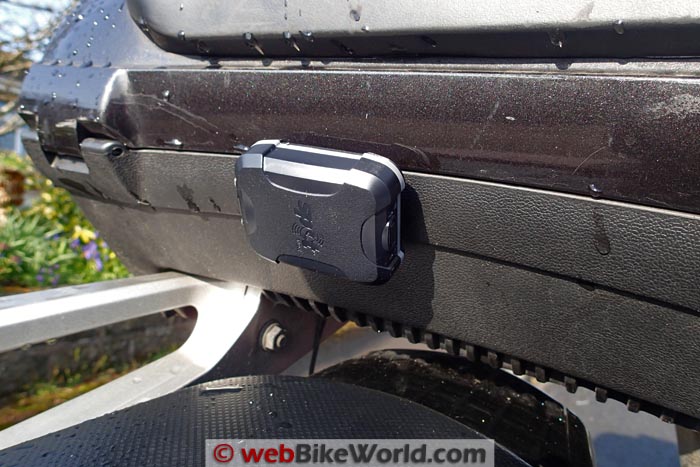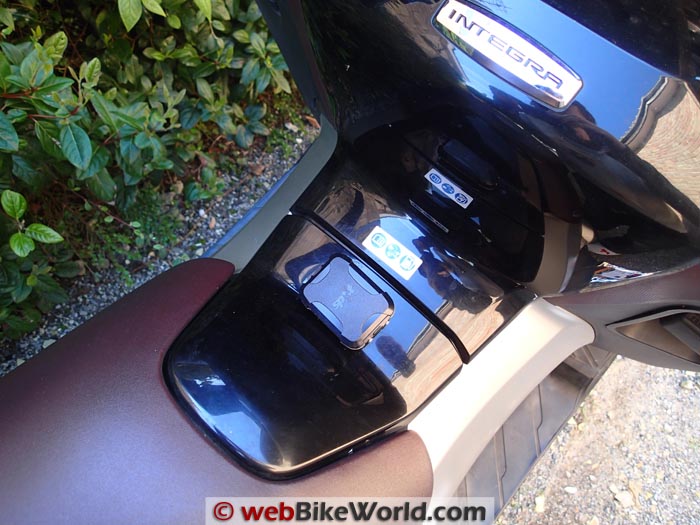The SPOT Trace is a small GPS tracking device used to track a motorcycle or scooter through a satellite network.
If your bike is moved or stolen, a text message or email is sent and you can follow its progress using Google Maps.
The SPOT Trace will also send a message if the battery power is low or off.
Owners can choose the message send rate, ranging from every 2.5 minutes to once per hour.
Send intervals vary, depending upon the service plan chosen by the owner.
The SPOT Trace system has a required monthly service plan charge, starting at $99.99 per year.
The product is currently available in the U.S.A. and will be released soon in the UK (more info in the summary table at the end of this article).
The downside is that the SPOT Trace requires a line-of-sight mounting, which means that it might be visible to a thief, who could simply remove and discard the tracker.
Whether your pride and joy is a top of the range sportsbike or a commuter moped, bike theft is a constant worry, especially for those of us who live in cities.
In the UK alone, more than 20,000 motorcycles and scooters go missing every year.
Most are sold on, broken for parts, or simply joyridden and then destroyed (as with two Vespa ET4s I owned in the early 2000s).
Despite chains, alarms and garages, the fact remains that if someone wants your bike badly enough they will probably manage to get it.
One of the latest weapons in the antitheft arsenal is the satellite tracker, which provides the means to trace a bike’s movements. New from SPOT, manufacturer of the popular series of tracking and messaging devices, is the SPOT Trace theft alert and tracking system.
I was loaned a demo model for review purposes by SPOT Europe.
How It Works
The SPOT Trace uses movement detection and GPS tracking. Once activated, the device will send a text message and/or email if your bike is moved, alerting you to possible theft or attempted theft.
Status updates at intervals from 2.5 minutes (with the “Extreme Tracking Upgrade” plan) to an hour allow you to follow your bike’s progress on Google Maps, and see where it eventually comes to rest.
Apparently, some savvy thieves will abandon a stolen vehicle overnight, in case a tracing system is being used and the owner comes looking for it.
You might not catch the robbers, but at least you will be (potentially) reunited with your bike.
You can also choose to receive an alert if the Trace is switched off or if the batteries are low, plus a daily alert to reassure you everything is OK.
SPOT products require a subscription service; you can consider it as a type of yearly insurance fee. The current service charges are $99.99 per year in the U.S. for the basic service, with the options of 5, 10, 30 or 60 minute notification times.
Subscribers can also customize the dock mode, the movement alert mode, status, low battery and power-off settings. The “Extreme Tracking Upgrade” costs an additional $99.99 per year and allows the 2.5 minute notification interval.
Specifications and Kit Contents
While the SPOT Gen3 GPS Personal Tracker (review) comes in bright orange, the SPOT Trace is a far stealthier matt black all over.
It measures about 2 inches (5 cm) across and about 2.7 inches (6.8 cm) tall. The Trace is nearly an inch thick (2 cm) and weighs a mere 88 grams.
SPOT lists the operating temperature range as a cold −22 F to a hot 140 F (−30 C to 60 C) and the listed operating altitudes from −328 ft to 21,320 feet (−100 m to 6,500 m).
It’s MIL-STD-810F humidity rated; SAE J1455 vibration rated and waterproof to IPX7 (1 meter for up to 30 minutes).
There’s a SPOT logo moulded into the top surface and two LEDs to indicate power and GPS signal, one each side of the rubber on/off button. The battery cover is held in place by two screws.
The device is powered by 4 AAA batteries (rechargeable will work) but it can also run off your bike’s battery, although the connection will not be waterproof without purchase of a specialist cable.
A standard micro-USB cable is included, providing a non-waterproof connection and also allowing firmware updates by connecting to a computer.
The Trace clips into a plastic case, which can then be permanently mounted to the bike — just snap the Trace out to turn it on or off, then click it back in. Mine came supplied with a selection of sticky, magnetic and hook-and-loop pads.
Also in the box is a twelve-month warranty and quick start guide.
Setup
Once I was ready to go, I visited the “findmespot” website and logged in to the test account tied to my device.
From here, I could set up various options, including frequency and content of alert messages, as well as my email address and mobile number.
Only US and European mobile services seemed to be available at this time, so I couldn’t test the SMS function, but I successfully signed up for alerts by email.
Attaching the SPOT Trace
Attaching the Trace to my scooter presented a problem. An anti-theft device should be concealed from prying eyes, but the SPOT Trace device is on the chunky side and it also needs a line-of-sight to the sky for the GPS to work.
Perhaps its presence will act as a deterrent in itself…or perhaps a thief will simply remove and discard it. At least that would trigger a movement alert.
[UPDATE: The SPOT Trace User Guide (.pdf) states that the device “…can be mounted beneath fiberglass, fabric or glass, but metal obstructions should be avoided”. The SPOT logo must be pointed towards the sky and it should “remain a minimum of at least 20 cm (7.9 inches) away from the human body”.]If I had purchased my own Trace and wanted to keep it on board permanently, I would invest in some kind of secure mount.
For my trial, of course, I didn’t want anything that involved modifying my bike, or that I couldn’t remove easily, leaving no sign it had ever been there.
I plumped for a spot just below the backrest on my top box, affixing the device with the supplied hook-and-loop fastener.
To turn the Trace on, press and hold the power button. On release, the power light flashes rapidly and the GPS indicator blinks red every few seconds until a signal is found, whereupon the light turns green and it’s ready to track.
Movement alerts are activated after the bike has been stationary for either thirty minutes or twelve hours, selectable through the website, so an alert won’t be triggered by placing the Trace on the bike after turning it on.
Use
Once equipped, I set out, only to find on arrival that the Trace had fallen off. No problem, I thought, it will tell me where it is!
However, it turned out the Trace had only managed to send one signal on its outing, having fallen off less than five minutes from home.
And by the time I checked the spot there was nothing there, suggesting my SPOT had either been deactivated and removed or, more likely, run over and scattered across a large area of roadside.
Luckily, SPOT’s representative found it hilarious that I’d managed to lose a device designed for tracking and location, and was kind enough to send me another. This time, I fastened it to a glossy, horizontal surface just below the handlebars, again using the hook-and-loop pads, and it lived to tell the tale.
As a test, I allowed my partner to “steal” my bike for half-an-hour (on the understanding that he wasn’t actually allowed to ride it like he stole it!), while I had a cup of tea with my mum.
He brought it back in one piece, albeit with the worrying comment that it was “perfectly adequate until you get above 90” and I donned my deerstalker to tell him where he’d been:
The Game is Afoot…
When I checked my email, I had an alert message from SPOT giving the position where movement was detected. I logged into the SPOT website and found a list of times and coordinates at five-minute intervals.
When I selected the option to view these on a map, markers clearly showed where my bike had been and when, allowing me to build up a picture of the route it had taken. If I subsequently receive a speeding ticket, I will have solid evidence that I shouldn’t be the one paying the fine!
Conclusion
Finding a suitable place to mount the SPOT Trace might be a pain and the device might be visible to thieves, which might also be both good and bad.
But once in position it is a simple, robust companion that could save you the expense and heartbreak of a stolen motorcycle.
Also: SPOT 3 GPS Tracker Review
Owner Comments and Feedback
See details on submitting comments.
From “J.M.” (February 2015): “I purchased a Spot Trace back in December activated it and all was fine, did what it was supposed to do until I went to turn it off. Would not turn off.
I contacted technical support he suggested I try changing batteries, that didn’t work so I filled out a warranty form and sent it back.
Just got the new one, activated and ready to go. Turned it on tried it out all worked well until I went to turn it off, would not turn off.
Contacted tech support again, they suggested I remove the batteries and then put them back in and turn it on and turn it off. It turn off.
I thanked them for the help and proceeded outside to test it out again. I turned it on it did what it was supposed to do, went turn it off same problem would not turn off. Has anyone had this same problem?”
UPDATE From “J.M.” (February 2015): “After my second replacement Spot Trace and a half dozen tech personnel, I finally spoke to someone that could tell me why I was unable to turn it off.
Normal thumb pressure that is required to turn it on will not turn it off.
She said I have to use my thumbnail with enough pressure that will actually bend my thumbnail and hold it until the green light flashes rapidly [3-5 seconds].
I tried that and it worked, I did it several times after that and it worked every time.
Apparently it’s made this way so that someone that may steal your asset will have a hard time turn it off.
My response was if the thief finds the Spot he will just simply throw it away or better still just leave it right were your asset was and you wouldn’t know it was gone until you physical checked.”
From “D.Y.” (June 2014): “I just finished reading your review of the SPOT Trace and have a comment.
Having used SPOT Tracker for hiking, biking and other activities, I can tell you from personal experience that while it works wonderful in a flat area/meadow/highway or even side of a mountain with no trees.
It works terrible in an “Urban Canyon” such as downtown San Francisco, even if you can see the sky doesn’t mean the satellites can see you.
Thus, a resourceful thief can just roll your bike into a multi-story parking garage and put into a metal box (container truck) to defeat the SPOT Trace pretty easily.
SPOT (Globalstar) had great potential with this device IF they had also included a SIM card slot that provided location service over GSM networks. It would then levy the best of both worlds: GSM network for urban location and SPOT satellites for middle-of-the-desert locating.
As it stands I think a tech-oriented rider could set up a GSM tracker with much better results. 15 second update rate, ignition cutoff over SMS and other great features those trackers offer.”
From “C.M.” (June 2014): “I saw in the comments a mention of using the Tile app for motorcycle tracking. Tiles are passive devices that rely on the Bluetooth signal from your phone for their location information.
Basically it would help you find the motorcycle you lost in the parking garage but would not help you find something that has been stolen or moved, unless it happened within 100 ft of your phone or another tile user’s phone.”
From “S” (June 2014): “I would like to know more information about the tracker. Pleas can you tell me how long the battery lasts in the device while we use them? I also would like to know that the battery is rechargeable? How long is take to recharge the battery? The device needs to use SIM card right, what can I buy from the telephone company?
Editor’s Reply: With regards to the battery life please see the SPOT Trace Battery FAQ (choose SPOT Trace then see answer 5 “What kind of battery life and performance can I expect from the SPOT Trace?).
This has a detailed table which shows that batteries last up to 2.7 Months if Trace is set to 2½ Minute Track Progress with 1 hour of movement per day and is operated at room temperature with a clear view of the sky.
Regarding the rechargeable battery question, the Trace uses AAA batteries. You can purchase 4 AAA Energizer NiMH rechargeable batteries (NH12). How long it takes to recharge them depends on the wattage of the battery charger and the power source.
Because it is a satellite device the customer does NOT need a SIM card.
From “T.B.” (May 2014): “Just a note on my experience with phone-based GPS and cellular used in conjunction with my BT headsets.
I’ve found that I get very accurate GPS data and phone connections if my phone is buried in my side cases, top boxes, inside the trunk of my Ural, or stowed in one of my ride jacket pockets.
I was really surprised the signals, especially GPS, worked through the metal trunk of the Ural.
I’ve used GPS navigation with two different Blackberrys (Curve and Bold) and two different Android phones (Samsung Galaxy S3 and Note 3) with both the Waze and Google Maps apps.
Further, when I’ve checked my locations at home, I’ve received 3m accuracy inside my house. As you know, if it was not getting a GPS location, the cellular location could be a mile away.
My suspicion is that this SPOT devices could be hidden from view, but the typical quick guides that pass as full instructions these days probably just stated the location of best performance.”
From “D.O.” (May 2014): “For the device to be an actual anti-theft tracker it has to be hidden. SPOT’s setup defies common sense and even your article’s introduction if it can simply be tossed off.
I just installed a (Finditnow) GPS tracking device on my HD Fatboy. The device is completely hidden and very responsive. It took me only about 20 minutes to install.
Granted the initial cost is much higher, but the annual cost is half of the SPOT device and it and seems to have a few more features.
You should do a few more of these reports. I wish there were some when I was shopping for one of these. But, I’m happy with what I bought.”
From “T.W.” (May 2014): “I’m betting that the Tile application would be of better use for tracking stolen motorcycles than the SPOT Trace. For one thing (and it’s a very important thing), the tiny Tile tracking device doesn’t have to remain visible.
I’ve pre-ordered four of them, and they should arrive soon. I’ll write a review of them for webBikeWorld…”
From “J.E.” (May 2014): “I agree that a tracking device needs to be hidden. However, please check the last FAQ on Spot’s web site. The answer to the question on operating limitations includes the following:
“The transmitter (located underneath the SPOT logo) needs to be pointed toward the sky, either outdoors or beneath fiberglass, fabric or glass.”
Have you tried mounting the Trace inside the lid of your top box?”
Editor’s Reply: Alice had to return the device, so we may never know. I don’t think many motorcycles or scooters have fiberglass, glass or cloth.
Panniers or a top box are usually made from some type of heavy plastic and it would be difficult to mount the Trace with the antenna side up underneath the lid of a top box. Perhaps the SPOT Trace could be mounted inside a tank bag, but surely a thief would find it there.
From “G.B.” (May 2014): “If the device needs a LOS to report its location wouldn’t a small piece of duct tape be considered an Anti-SPOT mechanism? Love this site.”
From “D.G.” (May 2014): “Thanks for the review. For an initial $200 and $99 every year after, I’d hope the device could be mounted out of sight, with an antenna probe or something for LOS.
Putting a tracking device in a visible location is one of the dumbest ideas I’ve seen in a while.
Who’s it supposed to deter, a motorcycle thief that can defeat the ignition, disc locks and an alarm, but not a surface-mounted tracking device?”
Editor’s Note: The list price is $99.99, not $200.00.


